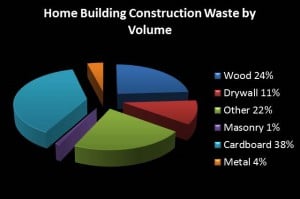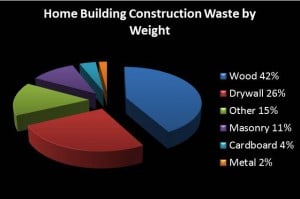Construction Debris Disposal, Recycling, And Outsourcing

One of the never-ending, most un-glamorous, and non-revenue generating tasks in every construction job is getting rid of the trash. Construction debris disposal is a job that has to be done, takes time to get it done, and costs money without adding any profit. But someone's got to do it!
How to Profit From Your Construction Debris Disposal
Fortunately, there are strategies that can be implemented by the forward-thinking contractor that can make a difference on the bottom line when it comes to disposal of construction debris. We've noted it before, but despite all the effort, planning, forecasting and estimating of costs that go into a construction job, the same level of attention is rarely applied to the debris disposal.
But this, too, can be planned for from a strategic and cost-effectiveness perspective with the right approach. Part of the strategy planning involves determining the actual costs associated with clean-up, hauling and disposing of construction site waste. Below are a few of the more apparent costs. Your particular situation may incur additional costs not listed here:
- Labor hours spent in clean-up and hauling
- Landfill fees and other associated costs (gas, wear on vehicles, etc.)
- Opportunity costs - loss of production by crew members cleaning, hauling, etc.
- Loss of vehicle use while hauling and dumping debris
- Any additional costs for properly disposing of hazardous wastes
Again, this is not an exhaustive list, but it does represent the typical expenditures - tangible and otherwise - that incurred in the simple task of removing debris from a job site.
The "Real" Costs of Your Construction Debris Disposal
The old saw that “time is money” is founded in a fiscal reality. If a contractor is paying a laborer, say, $20 an hour then his actual cost is closer to $27 an hour in California, for example. Paying a laborer to clean up a site, put it all in a company truck, then take it to a landfill – if possible – to dump it, clean out the truck, and return to the job site can take a great deal of time. In fact, depending on the size of the job and the amount of debris, it can run upwards to half a day or more.
So a five-hour clean up job not only costs the contractor over $135 in labor costs – plus gas, mileage, and dumping fees – but it also costs five hours of productivity lost at the construction site. Altogether, this task has cost the contractor over $300 and just to get rid of the trash!
Outsourcing As a Cost-Savings Strategy
For too many contractors this approach seems counterintuitive at best, and a waste of money at worst. But the truth is that outsourcing, when done properly, can actually save you money!
So, what are the benefits of outsourcing your construction debris removal task? Here are the three main ones which underscore our larger strategy:
1. Recover job-site production time otherwise lost to debris clean up and “dump runs”
Better to have your laborers on site working on tasks that produce revenue than to have them burning up a percentage of your budget off site at the dump or recycling center.
2. Minimize your clean up and disposal costs
Every hour spent and every employee engaged in clean up and disposal adds up. It can be significantly cost effective to outsource that work to a competent and professional specialist.
3. Eliminate the time and effort spent managing disposal and recycling logistics
Getting rid of your construction trash is not just a simple matter of “throwing it away.” Recycling is not only a good idea, but in many instances it is required. And with landfills disappearing, the acceptable options for proper disposal and recycling of construction site debris can be problematic. And you really don’t have time for that!
Who's Got Time for Recycling?
Have you ever wondered how much construction waste and debris you actually produce each year? Or how much is produced in general? The numbers are actually quite staggering, even given the recent slump in new construction in many regions in the country.
However, for the bulk of contractors working in the residential sector, the numbers are well documented:

Interestingly, the largest quantity of construction waste produced on an average home building site is made up of cardboard. Over a third of the accumulated debris and trash consists of it. The good news is that it is relatively lightweight and easily recyclable.

On the other hand, when the overall weight of each category of waste is considered, almost half of all the trash and debris produced in a typical residential construction site is made up of wood. This not only includes scrap and cut-offs, but wood from deconstruction as well as wood that was damaged or unusable after delivery.
According the EPA as a nation we produce over 200 million tons of construction waste annually. The good news, however, is that many types of waste materials generated from housing construction can be reused, refurbished, or recycled into usable products.
Conscientious builders and contractors can develop strategies to salvage useful materials for re-use:
- Instead of creating a pile of mixed materials when renovating or building your home, consider separating and salvaging useful materials, including lumber, fixtures, hardware, and appliances.
- One way to do this for an existing home is through deconstruction, the systematic and careful removal of materials from structures for reuse or recycling.
- Outlets are available in many areas to collect or purchase used and salvaged building materials, and some nonprofit organizations also accept used building materials.
Or recycle - many construction waste materials can be recycled where the facilities to do so are available:
- Wood can be recycled into reclaimed or composite wood products such as furniture and plastic/wood-composite decks, as well as mulch and other products. (Note: wood from decks, roofing or other outdoor applications was likely treated with chromated copper arsenate (CCA), a hazardous substance, and should be disposed, NOT reused, recycled or burned.)
- Asphalt, masonry, concrete, and rubble can be recycled into aggregate or new asphalt and concrete products.
- Metals, including steel, copper, and brass, are valuable commodities to recycle, especially in light of the current market for certain metals.
Recycling and re-purposing of construction waste makes a real difference. It is estimated that the area of landfill that is not needed because of recycling just construction waste is equivalent to over 4, 300 acres at a depth of 50 feet. That's over 3 billion square yards of landfill each year!
Finding Your Partners for Strategic Construction Debris Disposal
Junk King provides an efficient, safe and eco-friendly construction debris disposal service so you don’t need to worry about the pick up or disposal of the debris after your project is complete. Whether you need our services several times during a construction project or just once after it is complete, our hauling professionals will ensure that the construction debris is out of your way so that you can get on with the job.
How can you get us on the site for construction debris disposal? You make an appointment simply by booking online above or by calling us at (707) 744-4254. Our professional and insured hauling team will call 15 minutes before we arrive on your site and we’ll give you a free estimate based on how much room your debris takes up in our truck. We haul the construction waste into our junk removal trucks and with no hidden fees.
Our team specializes in construction waste removal. We can be at your facility in mere minutes, so call us today! Our crew is fully insured and well-trained, so you can trust them to get rid of your unwanted items in a professional and courteous fashion.
One of the best things about hiring Junk King is that we recycle a much of the material we pick-up. This is proof of our commitment to being an eco-friendly removal service. If you have questions about what we do or what we believe, give us a call at (707) 744-4254.
Construction Debris Disposal, Recycling, And Outsourcing